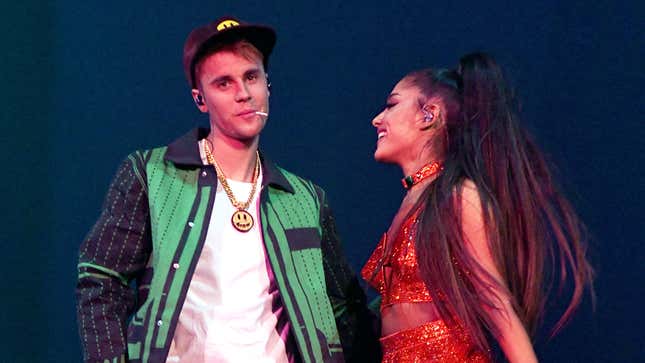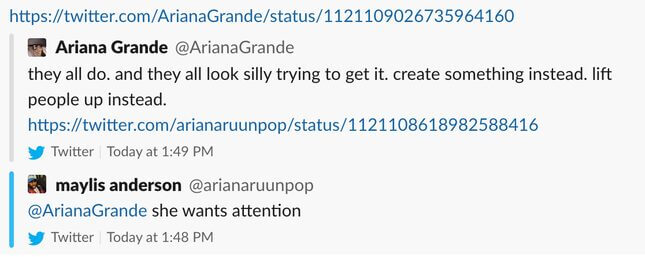The Demands of Positive Celebrity Coverage
Entertainment

It’s been a rough week to be a star, and a rough week to be someone who listens to what stars have to say. At least, that’s what social media tells me. Some of the most famous people making music today—Ariana Grande, Cardi B, and Justin Bieber (as well as Lizzo, a darling of critics and her fans but not quite of superstar status… yet?)—have shared their thoughts online regarding the state of media in 2019. None of it advocates for a free press, much less even contends with that notion. The gist is that journalism should be service journalism that primarily serves the powerful and their images.
If the stakes were more serious, if they actually posed a threat to the Constitution, you might say that these sentiments, at their broadest and least aware, were inching towards the fascistic. The actual situation is pretty ridiculous, and its potential outcome is not necessarily apocalyptic, but it’s worth noting that this wave of celebrities attacking the press and attempting to coerce it into “positive” coverage on their behalf comes during the presidency of a man who has relentlessly conflated criticism of him with lies, who has attacked outlets that investigate, question, and critique his performance and competence instead of journalistically fellating him.
We’re all sensitive people, and we have at our fingertips the availability to broadcast that sensitivity, whether by art or by its virtual opposite, the tweet.
Must be something in the air. As someone who gets paid to tell the truth, as best as I can muster it from my inherently fallible one-perspective human vessel, I’m galled by even the slightest attempt of a subject dictating coverage. And yet I think I understand to a certain degree why these celebrities seem so thin-skinned and intolerant of anything less than entirely credulous praise: The sensitivity that allows these people to express themselves in public also makes them vulnerable to whatever comes after. You can’t expect one channel without the other. The vast majority of us aren’t able to turn on and off emotions that easily. We’re all sensitive people, and we have at our fingertips the availability to broadcast that sensitivity, whether by art or by its virtual opposite (except in very select hands), the tweet.
But oh, do weeks like this make me wish there was another way, as I lie typing in the bed that hyper-connectivity has made. A trivial segment on E!’s Nightly Pop show, in which co-host Morgan Stewart did little more than point out Justin Bieber’s bad lip-syncing at Coachella (which was objectively and certifiably lax, in that he didn’t even bother to hold the microphone up to his face when he was supposedly singing at points), prompted a several-tweet read from Bieber:
Ariana Grande, whose Coachella set Bieber occasionally sang to a backtrack in the middle of, jumped in with an even more exacting indictment of internet media in now-deleted tweets:

You know, if she were curing cancer or figuring out a way to make sucking the carbon dioxide out of our atmosphere and blasting it into space politically feasible, I might care more about Ariana Grande’s definition of purpose. But she’s making pop songs. Art is inevitable and necessary, but if she weren’t doing what she does, someone else would be in her place, and the world wouldn’t know the difference. For all but an infinitesimal number of people in all of existence, “purpose” is a rather subjective scale (Bieber album titles be damned). I’m sure Ariana Grande’s 152 million Instagram followers, though, suggest otherwise to her.

Cardi B, meanwhile, posted a multipart video rant on Instagram in the wake of the Shade Room’s coverage of her husband Offset’s recent charges. She took the popular Instagram/website to task for not posting more positive content. Well, it’s not called the Shine Room.
That she began this demand for positivity by referring to Shade Room proprietor Angelica Nwandu as a “water buffalo built bitch” tells you everything you need to know about turning to Cardi B for etiquette guidelines. And all the high-minded “should”-slinging doesn’t acknowledge that writerly sensibilities are not easily segregated. They bleed into each other like paints. The press needs the freedom to be “mean” in order to be true. It’s not that Cardi is dead wrong about the Shade Room’s bias or totally clueless about how press works (she explicitly acknowledges that not all coverage will be positive). It’s just that these arguments against speech start to feel mighty hypocritical when spat from the tongues of public speakers from their oversized platforms. The underlying sentiment boils down to: “Shut up and listen. I get to speak, not you.” Kanye West has repeatedly taken this stance, denouncing criticism of his work, both specifically—after Pitchfork posted its rave 9.0-rated review of The Life of Pablo, West tweeted: “Pitchfork, the album is a 30 out of 10…To Pitchfork, Rolling Stone, New York Times, and any other white publication. Please do not comment on black music anymore.”—and in the abstract. Before the release of My Beautiful Dark Twisted Fantasy, which went on to be his most acclaimed album, West mused in an interview, “I’m offering so much more, the songs are 7-8 minutes long. How do you even send this in for reviews? Why would people even… review it?”Criticism just formalizes the unstoppable process of engagement. It does not refine or perfect it.
Sometimes it feels like nothing is ever enough. In 2017, Spin posted an exposé about the debacle that became the MTV News overhaul of 2015. One of the most alarming sections of the piece detailed how relationships between the network and artists interfered with objective journalistic coverage. Then-music editorial director Jessica Hopper told her staff that they might have to “nix” writing about DJ Khaled “unless it’s like, KHALED IS GREAT.” Additionally, a lukewarm review of a Chance the Rapper performance that focused on the ‘emotional disconnect’” writer David Turner felt listening to Chance’s Coloring Book album was deleted from the site after, according to a memo from Hopper, “Chance and his management became aware of [writer David Turner’s] piece via the repost on Snapchat Discover and subsequently told MTV, amid high level negotiations for linear specials, that he was never working with MTV again because of it.” When Spin reached out to Chance’s manager Pat Corcoran, he said that he and his client agreed the article was “offensive.”
-

-

-

-

-

-

-

-

-

-

-

-

-

-

-

-

-

-

-

-

-

-

-

-

-

-

-

-

-

-

-

-

-

-

-

-

-

-

-

-








































